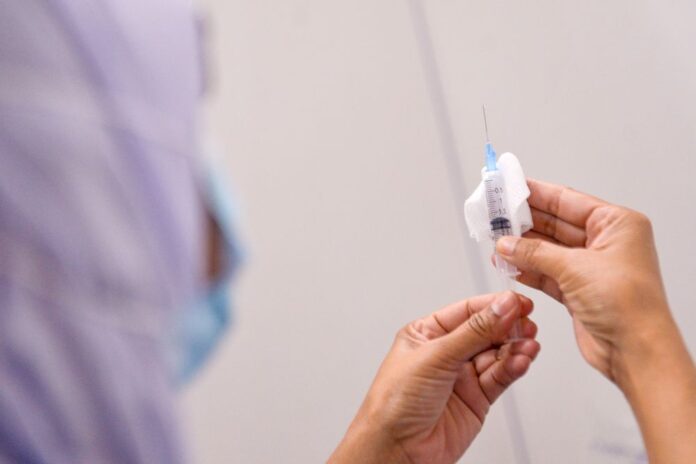A nurse loads a syringe with a dose Covid-19 vaccine at a vaccination centre in Kapar, Klang April 28, 2021. — Picture by Miera Zulyana
KUALA LUMPUR, Dec 1 — A recent survey has shown that other people, especially those deemed important, play a massive role in influencing and encouraging others to intensify their intent to get vaccinated against Covid-19.
The recent study carried out by market analysts Ipsos in collaboration with researchers from Monash University Malaysia, Sunway University and Universiti Sains Malaysia, showed that the intention to vaccinate among the public is at an optimum level when they are nudged by people who are important to them.
“These ‘influencers’ are critical in the decision-making process about the take up of vaccines. This suggests that identifying the ‘influencers’ who can promote vaccine uptake in the population is the way forward to ensure behavioral change among hesitant individuals.
“Cues to action are captured by media attention and interpersonal discussion. Media attention has, in the past, focused on older people with comorbidity issues, and little attention was placed on the younger group.
“Given that the youth are less likely to take up vaccination, the targeted design of persuasive messages to different age groups could facilitate behavioral change,” it said in a report.
The survey also found that the general public’s trust in vaccines influences three things: firstly an individual’s assessment about the risk of being infected, secondly an individual’s beliefs about the seriousness of infections of Covid-19, and thirdly the perceived benefits of vaccination for both the registered and non-registered respondents.
In addition, the researchers pointed out that although vaccination against Covid-19 in Malaysia has progressed well, with 94.3 per cent of the adult population having completed their two doses of vaccination, vaccine hesitancy may remain a challenge with the rollout plan for the third booster dose.
At the same time, there are still pockets of people within the population who have resisted vaccination, researchers said.
Perception towards Covid-19 vaccine
As for findings on perception towards the Covid-19 vaccine, researchers discovered that the intention to get vaccinated increased with age and education.
“Intention is higher among older age groups who are more vulnerable to severe illness from Covid-19.
“Higher intention among females may be attributed to women being more health conscious than men.
“Nevertheless, it is concerning that 21 per cent of males; 32 per cent of the 18 to 30 age group; and 24 per cent of the lower educated group are either unsure or have no intention to get vaccinated,” researchers said.
The study also found that there is a need to improve awareness campaigns to inform about individual benefits and its subsequent spillover into community benefits to further boost vaccination intention.
“Malaysians in all groups recognise that Covid-19 being a community-driven disease, the community is the greater beneficiary of vaccination,” researchers said.
From the study, researchers found that youths have a less positive attitude towards vaccines.
“A lower proportion of the youth has a positive attitude towards vaccination. A higher proportion of women, the elderly and the highly educated have a positive attitude towards vaccination,” researchers said.
As for what can encourage youths to get vaccinated, researchers said social cues could do the trick.
Researchers found that older people who are more at risk likely experience strong encouragement from their circle of family and friends to get vaccinated.
“Youth are less likely to get cues from their peer group who have lower intention to get vaccinated,” researchers said.
Researchers added that as vaccination against Covid-19 in Malaysia progresses at a rapid pace, the main challenge will gradually shift from procurement and distribution of vaccines to ensuring the broadest possible acceptance among all segments of the population.
“This is against a backdrop of a significant portion of the population who are either undecided or have no intention to get vaccinated.
“A particular focus should be the youth. Being less at risk for the most severe impacts of infection, the benefits are less obvious.
“Encouraging youth to accept the vaccine could have self-reinforcing effects as a social influence (eg, family, friends and peers) plays a key part in boosting vaccination intention,” researchers said.
The study was conducted among 804 Malaysian adults aged 18 years and above, from June 11 to 20, 2021.
The sample was collected via an online panel and skewed towards the more urban, connected population.
Researchers who were involved in the study are Dr. Jason Ng Wei Jian (Monash University Malaysia), Dr. Hwang Li-Ann (Monash University Malaysia), Professor Santha Vaithilingam (Sunway University), Professor Mahendhiran Nair (Sunway University), Associate Professor Kamarul Imran Musa (Universiti Sains Malaysia) and Ipsos Associate Director, Lars Erik Lie.


